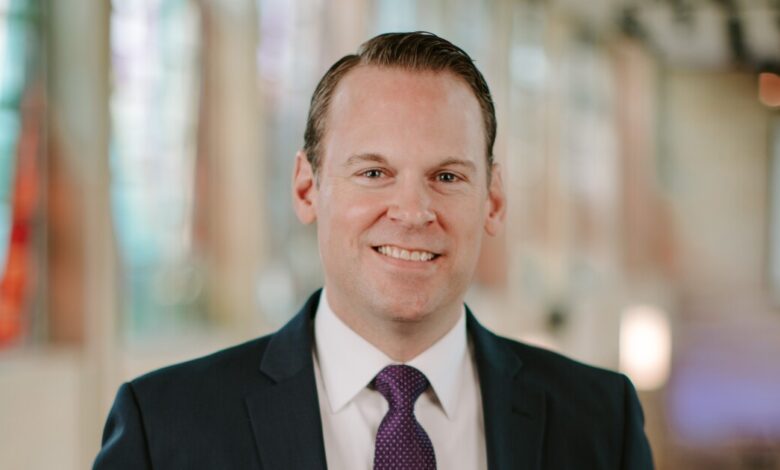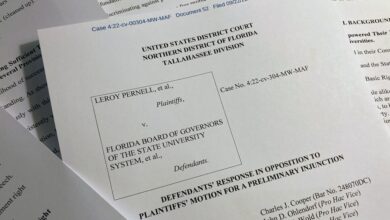A State Changed Its Dual-Enrollment Rules. It Sparked a Fight Over Religious Freedom.

Why are two colleges suing their state over a change to its dual-enrollment program?
The fight mostly boils down to this: whether high-school students have the right to take college courses, supported by state funds, at the campus of their choice — regardless of their faith.
The bigger picture, experts say, involves recent U.S. Supreme Court decisions and a series of similar standoffs nationwide over the rights of religious institutions.
Last week, two Minnesota colleges joined two families in a lawsuit against Gov. Tim Walz, a Democrat, claiming that a provision in the state’s new budget is an infringement on religious liberty.
The two colleges — the University of Northwestern, in St. Paul, and Crown College, in St. Bonifacius — are evangelical-Christian institutions that require all students taking classes on campus to sign a statement of faith. Northwestern and Crown enroll roughly one-fifth of the students in Minnesota’s popular dual-enrollment program, which allows high-school students to take college courses for free.
So the two institutions took notice when Democratic state lawmakers inserted a paragraph into this year’s budget bill that changed the program’s eligibility rules.
“An eligible institution must not require a faith statement from a secondary student seeking to enroll in a postsecondary course under this section during the application process or base any part of the admission decision on a student’s race, creed, ethnicity, disability, gender, or sexual orientation or religious beliefs or affiliations,” the provision stated.
Proponents say the new dual-enrollment restriction prevents statements of faith from being “barriers” to high-school students’ choice of postsecondary credits. Minnesota Rep. Laurie Pryor, a Democrat, wrote the provision. Pryor described herself as a person of faith, but said she would not be able to affirm the statements of faith that these colleges require.
She argued that the change protected students who could not truthfully sign the statements of faith from discrimination on the basis of religion.
“We are talking about high-school students,” she said. “We are talking about public dollars and we’re saying, ‘Don’t discriminate against students based on characteristics and beliefs.’”
But as Northwestern and Crown officials see it, faith-based colleges have the religious freedom to establish parameters around enrollment, even for a high-school student taking a course or two.
The parents who are suing also claim that their religious freedom is under threat. The bill “forces the Loe family and the Erickson family to either forgo receipt of an otherwise-available benefit or forgo their right to seek an education in accordance with their religious beliefs,” states the lawsuit, which was filed in federal court.
What the state of Minnesota has done, said Diana Verm Thomson, a Washington, D.C.-based lawyer representing the colleges and the parents, “is very blatantly unconstitutional and directly contradicts what the Supreme Court has recently said about government programs and religious discrimination.”
The lawsuit names the governor, the state’s education commissioner, and the state Department of Education as defendants, but they have not publicly responded. A department spokesperson said the lawsuit had been received and is currently under review. The governor’s office did not respond to a request for comment.
Nationwide Tensions
The Minnesota case is another recent example of a state or local government attempting to restrict religious institutions from a benefit available to both public and private colleges.
In April, Arizona Christian University sued a Phoenix school district that had decided to no longer allow the religious college to participate in its student-teacher program. School-board members argued that the university’s evangelical-Christian mission statement ran counter to the district’s efforts to support LGBTQ students.
The Alliance Defending Freedom, which represented Arizona Christian, countered that excluding the college from the program — a benefit given to nonreligious colleges — violated its religious freedom. In a settlement, the school district agreed to reverse the decision and pay Arizona Christian $25,000.
For the Minnesota colleges, the benefit in question is dual enrollment, a particularly salient issue because it’s a much-needed area of growth for higher ed. At a time of declining enrollment overall, many colleges are expanding their programs for high-school students to help fill the gap. That’s especially the case at Northwestern and Crown, with their large share of the state’s dual-enrollment students.
“That, I believe, is the trigger here,” said Michael Hamilton, a professor emeritus of history at Seattle Pacific University who studies evangelical-Christian higher education. “If these were relatively small, insignificant programs, then I think the legislators wouldn’t have bothered.”
Hamilton said he believes that the Minnesota legislation came out of a growing animosity toward some Christian colleges’ hardening of their moral convictions, particularly about sexuality.
Many Christian colleges do not require students to sign a statement of faith, but some that do have recently added or strengthened language in their statements that affirm traditional Christian perspectives on sexuality. Both Northwestern’s and Crown’s statements oppose sexual relations outside the boundaries of monogamous heterosexual marriage.
These colleges see their statements of faith as an exercise of their specific religious beliefs and intent for their educational environment.
Such institutions are known as “covenantal colleges,” which aim to create a learning environment where members are united in certain base beliefs, said Joy Mosley, associate vice president for government and strategic relations at the Council for Christian Colleges and Universities. Such statements of faith are “built into the fabric of the institution,” Mosley said, and altering that approach would run counter to what these institutions stand for.
Christian campuses without faith statements, known as “missional colleges,” are designed to “introduce [students] to the person of Jesus Christ” through the campus experience, Mosley said — a different educational goal.
In emails to The Chronicle, the presidents of both Northwestern and Crown, Corbin Hoornbeek and Andrew C. Denton, respectively, reiterated their loyalty to faith statements, even if it means forfeiting state dollars and losing the enrollment of high-school students in their courses.
“Even when faced with the threat of exclusion and reduced tuition dollars, we remain committed to equipping our students to grow intellectually and spiritually,” said Hoornbeek, who added that the legislation was “another opportunity to affirm” the university’s mission.
One legal expert said the colleges have a compelling case — especially given precedents set by the current U.S. Supreme Court. In three recent cases, the court ruled that a government benefit available to public and private institutions must also be provided to religious institutions, whether it’s funding for playground maintenance in Missouri or vouchers for private school in Maine and Montana.
Thus, observers of the case see a likely victory for the colleges and the families if the case goes to trial. Dmitry Bam, professor of law at the University of Maine School of Law, said that the federal district court would likely not want to risk being overruled by a higher court, and thus will probably let the precedent stand unless they can find a way to distinguish this case from the previous ones.
“These days, the trend is so much more erring on the side of these religious-discrimination claims,” said Bam. “Because you see what the court is going to do with them.”
Rep. Jim Nash, a Minnesota Republican, voiced strong opposition to the bill during its floor debate in April, and he’s not surprised that it is now the subject of litigation.
“I anxiously await the findings of the courts,” he told The Chronicle. “Because I believe that, like the other three states, Minnesota will be decided in favor of the religious institutions. And it will have been a costly exercise that the authors of the bill foisted on the state of Minnesota.”
Source link






